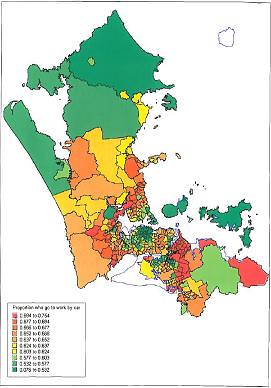(Cross-posted from Larvatus Prodeo, and aimed mainly at foreign readers)
Seven weeks out, and the New Zealand election campaign has yet to really get under way. While the date has been announced, Parliament is still sitting (under urgency, to get through a raft of Treaty settlement legislation and administrivia which really needs to be dealt with), and the campaign proper won't begin until it rises (which is likely to happen late tomorrow night, or maybe Friday afternoon). In the meantime, and in the absence of policy announcements, campaign scandals and such, I'm left with nothing to talk about but the broad issues.
Deborah has already covered what Labour has done in government over the last nine years. If re-elected, Labour will likely continue to govern in the same vaguely left-wing, incrementalist style, slowly extending employment rights and the welfare state as money becomes available. So in this post, I thought I'd look at the alternative: what would National do if they form a government?
A problem here is that we don't really have complete information to judge. National has been following a "small target" strategy, which means minimising differences with the government and refusing to release policy until the last minute so as to prevent public scrutiny - and government criticism. This is highly frustrating to those of us who like solid policy to chew on and pick through or who think parties should offer us meaningful policy choices rather than just one of red or blue. But there's still some policy out there, and some broad trends can be discerned.
(I should note here that I am a lefty, and so my perceptions of National's policy will inevitably be coloured by this. That's something you'll just have to deal with)
First, National would offer tax cuts. Great stonking ones, if you believe their finance spokesperson. Whether they'll actually be able to deliver in an economic environment which has their own leader warning against "lolly scrambles" is an interesting question, but they've previously expressed some willingness to run deficits if necessary - "balancing the books" apparently now being some sort of socialist plot. The exact shape of their tax cut programme will be announced some time after Treasury opens the books on October 6, but traditionally National has favoured the rich (sorry; "average" New Zealanders, which it defines as the 15% of the population who earn over $60,000 / year) over actual ordinary New Zealanders; I'll do a full distributional breakdown when the policy comes out.
Secondly, National would shift employment law back towards favouring the interests of employers. They have ruled out a return to the hated Employment Contracts Act, instead saying that they would "reform" the existing Employment Relations Act, but their announced policies indicate a clear desire to roll back Labour's reforms around union access to workplaces, collective bargaining, public holidays and annual leave, while introducing a 90-day "probationary" period in which workers could be fired at will. They are also likely to reduce employee and possibly government contributions to the KiwiSaver workplace savings scheme, and are highly unlikely to continue Labour's policy of regular increases to the minimum wage.
Thirdly, reforming the Resource Management Act - our core planning and environmental legislation - is a high priority for National, featuring in most of their policy announcements. The RMA allows local communities to control development, both through policy setting and participation in the resource consent process. National thinks this introduces uncertainty and increases costs; they would prefer a system where developers can do whatever they want without all of this messy "democracy" and "participation" business. Their solution is to erect barriers to public participation, preventing "frivolous" objections, holding hearings in the Environment Court (which means formality, lawyers, and cross-examination - all of which costs money and frightens people off), and introducing a priority consenting scheme allowing them to bypass the entire process for important projects and favoured applicants. This would both reduce participation, and significantly weaken environmental protections.
Fourthly, National have promised both to abolish the Maori seats, and to hold a referendum on MMP. The latter is a deliberate effort to roll back democracy and replace the current fair electoral system with an unfair one in which there are fewer checks on government power. The long-term story here is that democracy and coalition politics put an end to the neo-liberal policies National favours - once Parliament reflected the actual will of the people, such policies were a non-starter. So National seeks to advance its policies by stacking the electoral system and undermining democracy - a dangerous path which displays a deeply undemocratic mindset.
On health and education there is not much real information yet. National have made vague promises to improve outcomes (either literacy rates or elective surgery waiting times), but given no real details. They may provide more details during the campaign, or they may leave this area deliberately empty, so as to spring radical policies on us by surprise.
They have other policies - privatising ACC (our no-fault universal accident insurance scheme which keeps lawyers out of business), capping the number of public servants, using public-private partnerships for roads (which worked so well in Australia), and tweaking the Emissions Trading Scheme to favour polluters - but the above are the main ones. And while they have attempted to minimise differences, there's a clear distinction between them and Labour.
All of the above of course assumes that National gets to do what they want. But thanks to MMP, that is more difficult than it seems. While they are currently polling high, National is unlikely to win an absolute majority on election day, meaning they will need to talk to other parties if they want to pass legislation. And unless they manage to win more than ~46% of the vote, they will have to talk to parties beyond their preferred partners of ACT and United Future. The problem for National is that those parties - the Greens and Maori Party - are strongly opposed to these policies, and are highly unlikely to vote for them under any circumstances. So National may find itself in the unenviable position of being able to form a government, but unable to enact its preferred policy platform. National voters will be deeply unhappy with that. The rest of us will probably be somewhat relieved.







